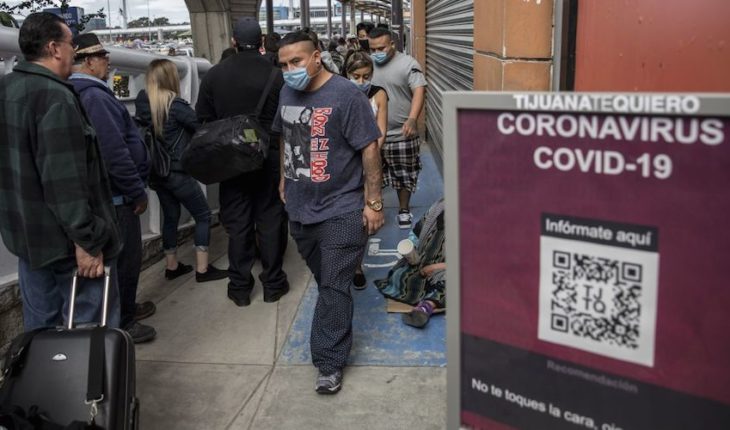“We have the numbers of the health jurisdiction but we don’t know where to go if there is a case of COVID-19.”
Sister Salomé Limas, head of the Madre Asunta hostel in Tijuana, Baja California, recognizes that there is nervousness in the face of the pandemic. He says they now have 51 people on their premises, but they have had to restrict access for fear that overcrowding will facilitate contagion. He complains that they have not received instructions from the authorities and that the number of people arriving at the shelter has increased by Mexicans returned from the United States.
The COVID-19 pandemic has rocked the migration flow northward. The logic of detention-confinement, both in the United States and Mexico, has been affected by exceptional measures taken by different countries to curb the spread of the virus.
EU restricts tourist passing from Mexico by COVID-19, but agrees not to affect trade
The United States will close the border to any crossing that is not “essential” and this affects the flow of migration. As president Donald Trump said, it will implement an “express” return system for those arrested across the border without documentation.
The chancellor, Marcelo Ebrard, said they will only accept the return of Mexicans and Central Americans, but not from other nationalities.
“If we are returned to people who are not Mexican or Central American, Mexico would not accept it, that is, that the United States will take care of that. In essence, we would maintain the same policy that we have followed until now, that is, Mexicans for obvious reasons, Central Americans, central Americas particularly from Honduras, Guatemala and El Salvador would give them the possibility to wait in Mexico, and that would be the policy we are going to follow,” said the chancellor, Marcelo Ebrard.
At the same time, Washington has paralyzed the system of receiving asylum seekers by legal points. As Soraya Vázquez, a lawyer for Families Belong Together, in Tijuana, explained, families with a hearing on Friday were not accepted by the Customs and Protection Office (CBP). “They were told to come back tomorrow for a new appointment,” he explained.
In Central America, the governments of Guatemala, El Salvador and Honduras have decreed the closure of borders. However, Guatemala is receiving deportee flights from the United States.
Mexico has suspended deportations to these three countries, according to official sources, which indicated that these procedures “can be resumed at any time”.
You may be interested: Bukele accused Mexico of airing people with COVID-19; we check and are healthy: Ebrard
Movements on the north and south borders are going to have an impact on the entire migrant care system in Mexico.
An information card distributed by the Migration Policy, Registration and Identity Unit of the Ministry of the Interior (Segob) to states and institutions recognizes the special vulnerability of migrants.
The document recognizes the “absence of efficient and effective coordination mechanisms between government authorities with staff providing care for migrants in shelters” and notes that the plans promoted by the Health Secretariat “do not make care visible to migrants, applicants for refugee status and does not emphasize the conditions of greater vulnerability to which they are exposed to the risks associated with their situation of migration and refugee irregularity overcrowding.”
It also warns: Mexico will require “adjustments in national planning” in immigration matters, “in order to implement immigration control measures in line with health control efforts”. “Immigration control often results in increased irregularity and invisibility of migrants and thus make their transit more dangerous, thereby affecting other health policy objectives,” he says.
Collapse in Tijuana
“We are going to collapse the hostels,” said Esmeralda Siu, a member of the Tijuana Pro-Migrant Coalition, in which various accommodation stays take part.
“As a civil society we are taking prevention measures, intensifying hygiene, so that there is no outbreak. But we have less space and more returnees,” he says.
The problem, in his view, is that the United States has increased returns from Mexicans who are arrested for trying to enter the country illegally. Estimates indicate that an average of between 120 and 180 people were deported each day for Tijuana. A figure that has now reached 200 or 220 a day. The total figure, according to Marcelo Ebrard, is 1,250 detainees a day across the border, of which 1,150 would be Mexican and Central American.
Preparing for the increase in returns by the United States, the National Migration Institute (INM) and the Ministry of Foreign Affairs (SER) issued a statement in which they announced that they will strengthen the attention at the borders and extend the schedules of the points by which it is returned to Mexicans.
“There are now many Central American and Mexican people who are on the waiting list for the asylum process. There are also returnees for express deportations. Mexicans are not put in detention centers, but are returned,” said Sister Salomé Limas of Madre Asunta. The nun explains that they are above their ability but that they put limits to prevent contagion.
He explains that they are trying to implement separation and hygiene protocols, but that no one in the government has addressed them.
“We don’t have protocols,” said Sergio Tamai, of the Migrant’s Hotel, in Mexicali. In his case, he acknowledged that they had received a visit from the Health Secretariat, but stated that they did not provide concrete instructions. “We don’t even have gel,” he said, complaining about his economic situation.
In Mexico City, they also denounced the absence of guidelines. “The authority says nothing,” said Gabriela Hernández of casa Tochán. It is the shelter itself that has improvised its own measures, such as restricting exits to the outside or insisting on hygiene recommendations. The threat from the pandemic is joined by the cuts. The government of Mexico City recently informed them that as of Monday they will no longer be delivered the 40 servings of food they provided to their users.
The absence of federal or state guidelines is repeated in the south, where the situation is completely different. Ramón Márquez, of the hostel La 72, explained that they now receive less influx than a year ago. However, the authorities are sending them to groups from immigration stations such as Villahermosa or Tabasco. These are asylum seekers who achieve an alternative to their detention situation.
Marquez said that they have no guarantees of the health status of arriving people, that they have developed their own protocol for the presence of Doctors Without Borders, but that the authorities do not support them.
Recently, the National Commission for Human Rights (CNDH) produced a recommendation urging the NSO to prevent overcrowding in migration stations to prevent contagion between migrants and detention centre workers. The INM responded that since January they had developed the actions recommended by the Ministry of Health to supply inputs such as soap and antibacterial gel. In addition, it said that its facilities are at 45% capacity (3,059 people in spaces where 6 thousand 728 could be accommodated).
The health crisis also affects the Mexican Commission for Refugee Aid (Comar). As explained by their manager, Andrés Ramirez, they are planning a method with which to serve applicants without the presence necessary, to avoid contagion. We operate in crowded conditions, we will try to do it remotely,” he explained.
In the face of the pandemic, civil society organizations participating in the Human Rights Observation and Monitoring Collective in SoutheastErn Mexico issued a statement urging an end to immigration detention and to release those locked up in detention centres; access to medical services; actions against xenophobia; regularization and protection of the Mexican population found in other countries.
What we do in Animal Político requires professional journalists, teamwork, dialogue with readers and something very important: independence. You can help us keep going. Be part of the team.
Subscribe to Animal Político, receive benefits and support free journalism #YoSoyAnimal.
translated from Spanish: CoVID-19’s impacts on migration to the US
March 21, 2020 |





